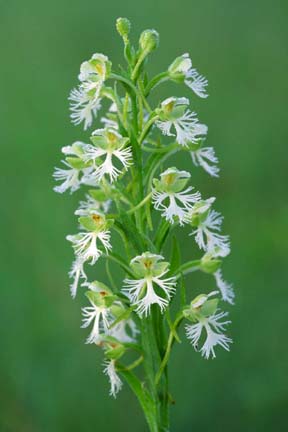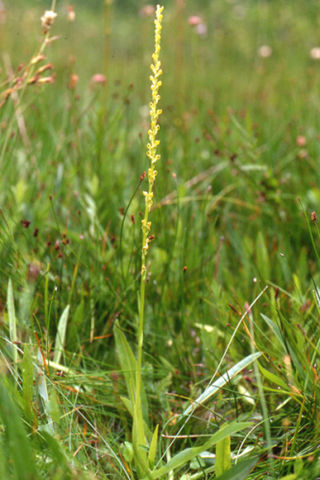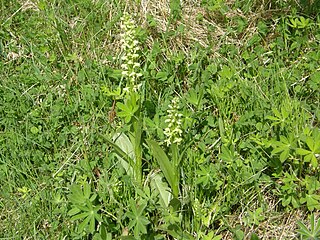
Platanthera praeclara, known as the western prairie fringed orchid and the Great Plains white fringed orchid, is a rare and threatened species of orchid native to North America.

Platanthera leucophaea, commonly known as the prairie white fringed orchid or eastern prairie fringed orchid, is a rare species of orchid native to North America. It is a federally threatened species, protected since October 30, 1989 under the Endangered Species Act of 1973. In Canada, it has been listed endangered under Schedule 1 of the Species at Risk Act since 2005. In 2014, the International Union for Conservation of Nature assessed it as "least concern."

Tipularia discolor, the crippled cranefly or crane-fly orchid, is a perennial terrestrial woodland orchid, a member of the family Orchidaceae. It is the only species of the genus Tipularia found in North America. It occurs in the southeastern United States from Texas to Florida, the range extending north into the Ohio Valley and along the Appalachians as far north as the Catskills. There are also isolated populations in Massachusetts and in the Great Lakes region.

The genus Platanthera belongs to the subfamily Orchidoideae of the family Orchidaceae, and comprises about 150 species of orchids. The members of this genus, known as the butterfly orchids or fringed orchids, were previously included in the genus Orchis, which is a close relative. They are distributed throughout the temperate regions of the Northern Hemisphere. They are terrestrial and have tubercules.

Platanthera chlorantha, commonly known as greater butterfly-orchid, is a species of orchid in the genus Platanthera. It can be found throughout Europe and Morocco. The name Platanthera is derived from Greek, meaning "broad anthers", while the species name, chlorantha, means "green-flowered".

Platanthera yosemitensis, the Yosemite bog orchid, is a species of orchid that is endemic to nine wet montane meadows between the main stem and the South Fork of the Merced River in Yosemite National Park.

Platanthera blephariglottis, commonly known as the white fringed orchid or white-fringed orchis, is a species of orchid of the genus Platanthera. It is considered to be an endangered species in Connecticut and Ohio, a threatened species in Florida, Maryland and Rhode Island, exploitably vulnerable in New York, and susceptible to be threatened in Québec.

Platanthera grandiflora, the greater purple fringed orchid, is a species of orchid, genus Platanthera, occurring from Ontario to Newfoundland, south along the Appalachian Mountains to northeastern Georgia, with an isolated population in Illinois. It is imperiled in Georgia, Tennessee, Virginia and North Carolina and presumed extirpated in Ohio.

Platanthera huronensis, the Huron green orchid, is a species of orchid native to the United States and Canada. It has a discontinuous range, the eastern range including eastern Canada from eastern Manitoba to Labrador, plus New England and the Great Lakes states. The western range extends along the Rocky Mountains from New Mexico to Alberta, as well as the coastal ranges of Washington, British Columbia and southern Alaska.

Platanthera psycodes, commonly called lesser purple fringed orchid or small purple-fringed orchid, is a species of orchid, genus Platanthera, occurring from eastern Canada to the east-central and northeastern United States. It is imperiled in Illinois, Tennessee, North Carolina, and Kentucky.

Platanthera transversa is a species of orchid known by the common names royal rein orchid and flat spurred piperia.

Platanthera hyperborea, the northern green orchid, is small orchid found only in Greenland, Iceland, and Akimiski Island in Canada. Numerous authors cite the species as widespread in other parts of Canada and also in the United States; such populations are more correctly referred to as Platanthera aquilonis.

Platanthera obtusata, common name blunt-leaved orchid or small northern bog orchid, is a small species of orchid in the genus Platanthera. It widespread across much of the colder regions of the Northern Hemisphere, though rare in some parts of its range. Two subspecies are recognized:

Platanthera flava, the palegreen orchid, is a species of pale-flowered orchid. It is native to eastern North America, from Texas east to Florida, north to Ontario, Quebec and Nova Scotia.

Platanthera orbiculata, the round leaved orchid or lesser roundleaved orchid, is a species of orchid native to forested areas of North America. It is widespread across most of Canada and parts of the United States.

Liparis liliifolia, known as the brown widelip orchid, lily-leaved twayblade, large twayblade, and mauve sleekwort, is a species of orchid native to eastern Canada and the eastern United States. It can be found in a variety of habitats, such as forests, shrublands, thickets, woodlands, and mountains. The orchid is considered globally secure, but it is considered rare or endangered in many northeastern states.

Platanthera nivea, commonly called the snowy orchid, is an orchid species of native to the Southeastern United States. Its range is almost entirely restricted to the southeastern Coastal Plain, with a few notable inland populations such as in Coffee County, Tennessee. Within this range, it is found in wet savannas and bogs.

Spiranthes ovalis, commonly called the October lady's tresses, is a species of orchid that is native to eastern North America.

Platanthera dilatata, known as tall white bog orchid, bog candle, or boreal bog orchid is a species of orchid, a flowering plant in the family Orchidaceae, native to North America. It was first formally described in 1813 by Frederick Traugott Pursh as Orchis dilatata.

Platanthera aquilonis, the northern green orchid or north wind bog orchid, is a species of self-fertilizing orchid native to the United States and Canada with a widespread distribution across the two countries.




















